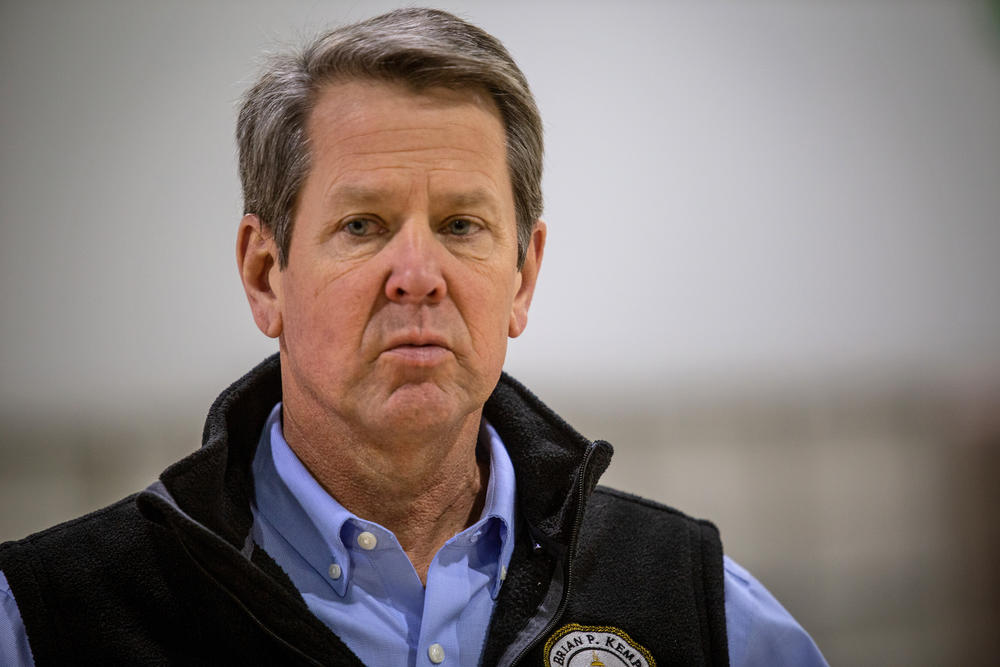Section Branding
Header Content
Despite Criticism, Georgia's Governor Will Let Shelter-In-Place Expire For Most
Primary Content
Georgia's shelter-in-place order will expire for most people at 11:59 p.m. Thursday, but Gov. Brian Kemp is urging Georgians to stay at home while the state continues to combat the virus, the governor said Thursday.
In a video message, Kemp said that a new shelter-in-place order for the "medically fragile" will run through June 12, as will the state of public health emergency.
https://www.youtube.com/watch?v=lrjvGaNhF1Y&feature=youtu.be
Those deemed "medically fragile" include people over 65 years of age, nursing home residents, those with chronic illnesses or are immunocompromised.
For the rest of Georgia's 10.6 million people, the governor is extending until May 13 dozens of extra health and safety rules for businesses that want to open to the public.
MORE: How Bowling Alleys, Restaurants Choose Whether To Reopen In Georgia
Places like barbershops and nail salons must continue to follow extra precautions, like requiring appointments and making people wait in their cars until they are served. Gyms must cancel group classes and keep basketball courts and saunas closed.
Since Monday, restaurants have been allowed to reopen dine-in services, so long as there are no more than 10 people per 500 square feet and 38 other rules are met. That includes the criteria that “where practicable, take-out and curbside pick-up services should be prioritized over dine-in services.”
Bars, public swimming pools and live performance venues will remain shuttered until May 13, unless the governor decides to extend the closure.
RELATED: Georgia Will Not Require Road Tests For Driver's License During Pandemic
Kemp’s announcement has been widely criticized by public health officials and politicians alike for being one of the first states to ease restrictions, and in such a drastic manner.
Shortly after Thursday’s announcement, Democratic Party of Georgia chair State Sen. Nikema Williams (D-Atlanta) called the governor’s decision a “dangerous game” for Georgians.
“It is reckless and irresponsible for Kemp to use Georgians as the guinea pigs in a public health experiment that will go wrong,” she said. “Today’s decision will have consequences — for our overworked health systems, for our struggling essential workers, and for our lives.”
RELATED: Study finds black Georgians disproportionately hospitalized with virus
More than 1,100 Georgians have died from COVID-19, and all but two counties have seen cases of the virus over the last two months.
A new study from the Centers for Disease Control and Prevention looking at cases in March found that black Georgians were disproportionately hospitalized with COVID-19, and data from the state shows that while black Georgians are about 30% of the state’s 10.6 million people, they comprise just over half of the coronavirus deaths.
Atlanta Mayor Keisha Lance Bottoms penned an op-ed in The Atlantic, redoubling her opposition to Georgia’s plan and calling for residents to stay home.
“I may not have the legal authority to override the state,” she wrote. “I do have the right to use my voice to encourage people to exercise common sense, listen to the science, follow guidelines from the Centers for Disease Control and Prevention, and stay home, if at all possible. We will transition to opening Atlanta when the health experts tell us that it is safe, and we will be a stronger city because of our prudence and deliberation.”
It's not just Democrats that are concerned with the reopening.
Last week, President Trump spent several days criticizing Kemp’s plan, calling it “too soon” to reopen and backpedaling from earlier support.
"I told the governor of Georgia, Brian Kemp, that I disagree strongly with his decision to open certain facilities which are in violation of the phase one guidelines for the incredible people of Georgia," he said. "But at the same time, he must do what he thinks is right."
Kemp has stood by his decision, downplaying the measures as a minor step in righting the economy while touting increased hospital capacity, gradually increasing testing numbers and incomplete data from health officials that might suggest a plateauing of cases.
As of Thursday morning, less than 1.5% of the state's population has been tested for COVID-19.


